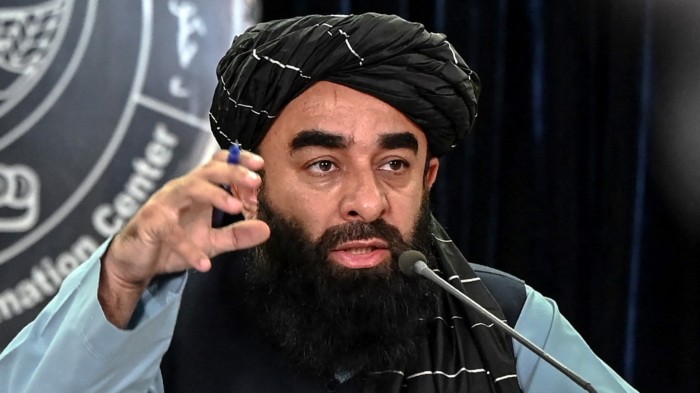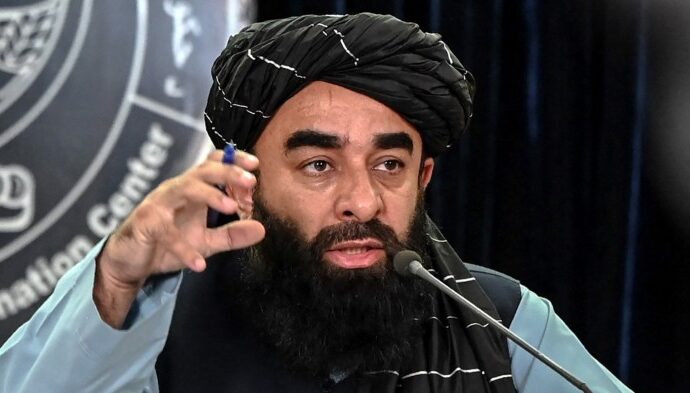
Unlock the White House Watch newsletter for free
Your guide to what Trump’s second term means for Washington, business and the world
Afghanistan said on Sunday that it had killed 58 Pakistani soldiers along the countries’ 2,600km border, in retaliation for what Kabul said was a strike by Pakistan last week on the capital.
The Taliban-led government’s defence ministry said the Afghan Armed Forces had launched a “retaliatory operation” against Pakistani forces posted at the border, which concluded around midnight.
Zabihullah Mujahid, the spokesperson for the Taliban government, claimed in a press conference in Kabul that Afghan forces had crossed the border to target military posts, killing more than 50 Pakistani soldiers and injuring two dozen others.
“The situation on all official borders and de facto lines of Afghanistan is under complete control, and illegal activities have been largely prevented,” he said.
Relations between the neighbouring countries have nosedived in recent months as Islamabad accuses the Afghan Taliban, which it had backed during the latter group’s 20-year war against Nato forces, of failing to rein in the Tehrik-e-Taliban Pakistan, known as TTP, or Baloch separatist groups operating from its soil.
In a statement early on Sunday before the Taliban claims, Pakistan’s interior minister Mohsin Naqvi said Afghanistan had engaged in “unprovoked firing” on “civilian populations” and that the Pakistani military had delivered “a swift and effective response”.
Pakistani security officials also said they shot back at Afghan forces, and shared videos — which could not be independently verified — of Afghan border posts and tanks being bombed.
There was no immediate comment from the Pakistani military regarding the Taliban’s claims of casualties, but one senior security official said the numbers were “way wrong” and said the Pakistan Armed Forces would officially address them.
In his statement, Naqvi hinted at further escalation to come. “Afghanistan will also be given a befitting reply like India, so that it will not dare to look at Pakistan with a malicious eye,” he said, referring to the conflict in May that brought South Asia’s nuclear powers to the brink of an all-out war.
Ishaq Dar, Pakistan’s deputy prime minister and foreign minister, later wrote on social media platform X that Pakistan was striking Afghan Taliban infrastructure, as well as TTP and Baloch separatist hide-outs in Afghanistan.
“Our defensive response is not targeted towards peace loving Afghan civilian population. Unlike Taliban Forces, we are exercising extreme caution in our defensive responses to avoid loss of civilian lives,” he wrote.
The Afghan Taliban have repeatedly said they do not allow their soil to be used for terrorism against other countries, and have said militancy is an internal issue for Pakistan.
The Taliban’s foreign minister Amir Khan Muttaqi told reporters in New Delhi, where he is on a high-profile visit that has irked Pakistani officials, that Afghanistan “achieved the objective of our retaliatory mission”.
He reiterated the Taliban’s claim that “there are no TTP safe havens in Afghanistan”.
“Pakistan’s people and its leadership — they want good relations with Afghanistan,” said Muttaqi, who faces UN sanctions. “But there are some groups in Pakistan that are trying to spoil the situation.”
This year, about 900 Pakistani security forces and more than 500 civilians have already been killed by insurgents near Pakistan’s porous western border, according to the South Asia Terrorism Portal, the highest number since 2009.
On Thursday, Taliban officials said the “sound of an explosion” was heard in Kabul, but claimed there had been no casualties. The next day, Afghanistan’s defence ministry accused Pakistan of “violating the air space” over Kabul and bombing a “civilian market” near the border.
Pakistan’s military did not confirm or deny their involvement in an air strike.
Both sides have engaged in border skirmishes before, and Pakistan has since last year been linked to multiple air and drone strikes against alleged militant camps on the Afghan side of the border. Islamabad has openly acknowledged at least one such attack.
The foreign ministry of Saudi Arabia, which signed a mutual defence pact with Pakistan last month, called in a statement for “restraint, the avoidance of escalation, and the adoption of dialogue and wisdom”.


